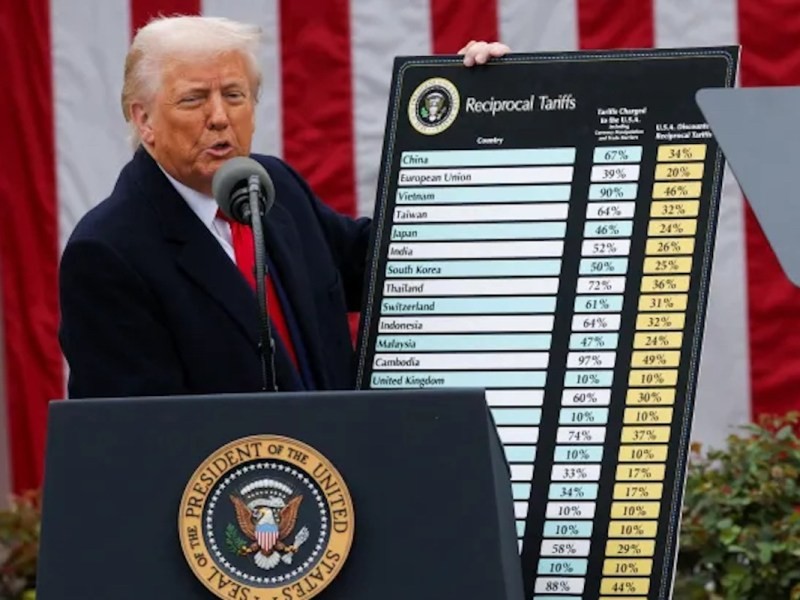It’s not hard to make the case for bringing factories back to the United States. It’s likewise not hard to understand that some carefully targeted tariffs, especially when coupled with other industrial-policy measures, would give this “reshoring” a boost.
It’s impossible to make the case for very high tariff levels on everything made by almost every country on earth. There are a great many things wrong with what this administration is doing. Let me count the ways.
One: The tariffs cover minerals our country doesn’t have and bananas, coffee and other products we’re ill-situated to produce in large quantities. They won’t help producers much; they will make Americans pay more for those things.
Two: We don’t need to bring low-wage manufacturing back to the U.S. when multiple countries make the products. Having diverse suppliers eliminates the danger of dependency on a single supplier that could cut us off — think China. We want Americans to have high-wage jobs; we don’t have to make everything here.
Three: Tariffs won’t encourage businesses to invest in factories if businesses think the tariffs might be temporary. Tariffs imposed by one president can be revoked by the next – or by the same president if he’s simply using tariffs to score negotiating “wins” he can boast about. Or being coy about whether they’re permanent or just negotiating leverage.
Four: US export industries including agriculture had been bracing for retaliatory tariffs. They’re definitely going to get them.
Five: Today’s manufacturing supply chains, the product of decades of relatively free trade, are complicated and multinational. An iPhone typically contains parts from 40 countries. The best-selling American-made vehicle, the Ford F-150 pickup truck is 50% parts from at least a dozen countries. Even if tariffs induce businesses to make more parts in the US, it will take years to reorganize these supply chains.
Six: The emergency economic powers law Trump relied on to justify the tariffs does not authorize the president to impose tariffs.
Seven: The wage gap between the US and many developing countries is so wide that even with tariffs the factories having the greatest chance of being reshored here will be highly automated. They won’t employ large numbers of workers; the workers they do employ will need high skill levels, maybe associate degrees. There’s a shortage of such workers in the US now, as well as a shortage of engineers.
Eight: Why do we need 10% tariffs on countries with which the US runs trade surpluses, like Australia and the United Kingdom?
Nine: High and broad tariffs may well reduce US trade deficits, but they’ll do that by slowing the economy’s growth or even bringing on a recession. Tariffs discourage consumption by making imported products more expensive and allowing domestic competitors to raise prices. Economist Richard Katz noted that over the last six decades, the US trade deficit has declined in years when economic growth slowed and increased when the economy grew faster.
Ten: “Reciprocal” tariffs aren’t calculated by dividing trade deficits with a country by imports from it and then halving the answer. Reciprocal tariffs are about products, not trade deficits. Two countries can negotiate perfectly reciprocal tariffs and yet one may still run a large trade surplus with the other.
Eleven: Leaving Russia off the list while imposing tariffs on US allies is bizarre. The administration imposed tariffs on two uninhabited islands, but not on Russia, which ran a trade surplus with the US last year of $2.5 billion on $3.5 billion in total trade.
Twelve: One year does not make a trend, but the administration calculated the tariff levels using only the latest year’s trade-deficit and import figures. If multi-year averages had been used, the tariff levels would have looked very different – some higher, some lower.
Bottom of Form
Thirteen: These tariffs are in violation of US obligations as a World Trade Organization member and in violation of trade agreements with Canada and Mexico, South Korea, Australia and other countries. This undermines our country’s ability to object when other countries violate treaties and laws.
Fourteen: The loss of confidence in the United States resulting from this imposition of tariffs will have unhappy effects. Foreigners will be less inclined to invest in the US and more inclined to look to alternative reserve currencies.
Fifteen: If other countries are forced to trade less with the US, with whom do you think they’ll trade more – and have closer relations with? Yes, China.
I am sympathetic to the goal of doing more manufacturing in the US. These tariffs are not the way to do it.
Source Courtesy: Asia Times





